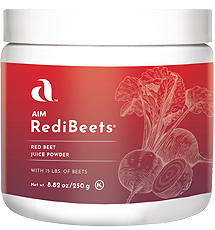 RediBeets RediBeets
Many ancient peoples believed the shape and color of a plant was  indicative of how the plant could help them, and beets were no
exception. Because of their "blood red" color, beets were believed
to be good for the blood and were eaten to improve "weak" blood.
Folklore also tells us that Greeks used beets to "cool" blood, while
Romans used beets to fight fever.
indicative of how the plant could help them, and beets were no
exception. Because of their "blood red" color, beets were believed
to be good for the blood and were eaten to improve "weak" blood.
Folklore also tells us that Greeks used beets to "cool" blood, while
Romans used beets to fight fever.
Like much of the folklore about herbs, there may be a kernel of
truth in these traditional beliefs. Beets do contain nutrients that
are good for you. One cup of raw beets is high in carbohydrates
and low in fat. It contains phosphorus, sodium, magnesium,
calcium, iron, and potassium, as well as fiber, vitamins A and C,
niacin, folic acid, and biotin. Although these are not found in
"RDA" quantities, we must remember that nutrients derived from
a natural source may be "better" than those found in supplements,
as they may be more readily absorbed, and many believe that
natural proportions are superior to mega doses of synthetic
vitamins.
Current Uses
According to John Heinerman, in the Encyclopedia of Healing
Juices, beets (and beet juices) are a blood-building herb that
detoxifies blood and renews it with minerals and natural sugars.
The encyclopedia goes on to note that there may be substances in
beets that aid circulation.
Other sources also speak highly of beets and beet juices. Dr.
H.C.A. Vogel, in The Nature Doctor, states that beet juice
contains betaine, which stimulates the function of liver cells and
protects the liver and bile ducts. Dr. Norman Walker, D.Sc., in
Fresh Vegetable and Fruit Juices, claims that beets build red
corpuscles and add tone to blood.
Of course, many of these claims are not substantiated in a
"traditional" sense. Should we believe them? The universal
acceptance of plant phytochemicals_substances found in plants
that might play a role in preventive health_might at least nudge us
to the willingness to accept the possibility that beets have benefits.
After all, it seems that every time you open the newspaper you
read about fruits, vegetables, and health.
In 1994, Newsweek magazine ran a cover story on
phytochemicals. Just last fall, USA Weekend, a popular Sunday
newspaper insert, featured Jean Carper and "Anti-aging" foods.
She has written several books on the benefits of fruits and
vegetables and their phytochemicals. In a more "official" realm,
the National Cancer Institute suggests that we eat five or more
servings of fruits and vegetables per day and is also a big
supporter of research on phytochemicals: It has launched a
multimillion-dollar project to find, isolate, and study
phytochemicals.
All in all, there is little doubt that fruits and vegetables are good
for you and may help our health in ways we do not yet know. So
eat a lot of them. Why not include beets?
 RediBeets RediBeets
RediBeets offers a convenient way to make beets part of
your daily diet.
The half-pound of beets used to make a teaspoon of RediBeets is
residue-free, and the beets are processed in a state-of-the-art
facility that separates the juice_and its valuable nutrients_from
the plants' fiber. In this process, the beets are not subjected to
high temperatures that may damage their nutrients.
As part of a regular juicing program, RediBeets provides one of
the most convenient ways to achieve an improved diet through
regular consumption of five or more servings of vegetables a day.
Directions
RediBeets can be taken dry or mixed with two to three ounces of
water, juice, or Barleygreen. The recommended serving is one
teaspoon twice a day on an empty stomach.
Because beet juice can have a strong effect on some individuals
when they use it for the first time (dizziness due to detoxification),
it is suggested that you take the recommended serving. Do not
exceed two servings per day without the advice of your health
practitioner.
Consider adding BarleyLife and Just Carrots for a complete juicing program.
Further Reading
Heinerman, John. 1944. Encyclopedia of Healing Juices. West
Nyack, NY: Parker Publishing Co.
Vogel, Dr. H.C.A. 1991. The Nature Doctor. New Canaan,
Conn.: Keats Publishing, Inc.
"Beet juice aids stomach upsets, some cancers," in Better
Nutrition for Today's Living. Oct. 1994.
Walker, Norman W. D.Sc. 1970. Fresh Vegetable and Fruit
Juices. Prescott, AZ: Norwalk Press. "AIM products are not intended to diagnose, cure, treat,
mitigate, or prevent a disease or illness. Results may vary per person"
Leave us Your Questions or Comments Online
|


